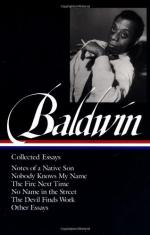
|
| Name: _________________________ | Period: ___________________ |
This test consists of 15 multiple choice questions and 5 short answer questions.
Multiple Choice Questions
1. What does Baldwin regard as the most important thing about the film Carmen Jones?
(a) The impression it leaves about the realities of Negro life.
(b) The questions it leaves in the mind relate more to inferior life of Americans.
(c) The changes it suggests about the lives of Negroes.
(d) The questions it leaves about the relationship between Whites and Negroes.
2. Why did Baldwin think the Negro vote was so easily bought and sold in the 1940s?
(a) Because Blacks were in need of money.
(b) Because Blacks did care about politics.
(c) Because Whites has a great influence in Black politics.
(d) Because it was treated with little respect.
3. According to Baldwin, who are the three most important characters in Uncle Tom's Cabin?
(a) George, Miss Ophelia, and Uncle Tom.
(b) George, St. Clair, and Uncle Tom.
(c) George, Eliza, and Uncle Tom.
(d) Uncle Tom, Miss Ophelia, and Eliza.
4. Why does Baldwin insist that the operatic songs performed by the cast in the film Carmen Jones have no connection to Negro life?
(a) The music pieces were sung by white men and dubbed over the black actor's lip syncs.
(b) The music pieces were sung by white people and dubbed over the black actor's lip syncs.
(c) The music pieces were sung in Italian and dubbed over the black actor's lip syncs.
(d) The music pieces were sung by middle class black people and dubbed over the black actor's lip syncs.
5. Who is the author of Uncle Tom's Cabin?
(a) George S. Schuyler.
(b) James Baldwin.
(c) Richard Wright.
(d) Harriet Beecher Stowe.
6. What does Baldwin suggest the presupposition of the two novels Kingsblood Royal and If He Hollers Let Him Go are in the chapter entitled Many Thousands Gone?
(a) Blacks need to make themselves less offensive.
(b) Black is a terrible color with which to be born into the world.
(c) Black men are inferior to white men.
(d) The Negro is a man without a homeland.
7. Where is Atlanta located?
(a) New York.
(b) Georgia.
(c) Mississippi.
(d) Tennessee.
8. Protest novels are said to resemble:
(a) Missionaries to India.
(b) Missionaries to America.
(c) Missionaries to South America.
(d) Missionaries to Africa.
9. According to Baldwin, both the Negro and the Jew are characterized as:
(a) Helpless.
(b) Cheerful.
(c) Jobless.
(d) Religious.
10. Where can the true raison d'être of the Negro press be found?
(a) Lifestyle sections of the Black magazines.
(b) The front pages of the Negro newspapers.
(c) Ebony magazine.
(d) Letters to the editor.
11. How is history and the progress of the Negro described in the chapter entitled Many Thousands Gone?
(a) Sufficient.
(b) Non-existent.
(c) Social.
(d) Anti-Social.
12. Why is the language and dialect in the film Carmen Jones considered an insult on black people?
(a) Because the characters speak like enslaved Africans.
(b) Because the characters speak like stereotypical Negroes.
(c) Because the characters speak like antebellum Negroes adopting the patterns language of their masters.
(d) Because the characters speak like northern born Negroes.
13. According to Baldwin, what color are the robes of the saved?
(a) Green.
(b) White.
(c) Red.
(d) Black.
14. According to Baldwin, if black faces cannot be made white then what other way can they be changed in order to be less offensive to white society?
(a) White.
(b) Clear.
(c) Blank.
(d) Light.
15. Why does Baldwin assert that White people contribute to the perpetuation of the stereotypical characters such as Aunt Jemima and Uncle Tom?
(a) Because Whites want to believe the happy, subservient personas of Black people
(b) Because African Americans love to imitate these types of stereotypical characters.
(c) Because Whites want to believe that Black people are unhappy with their lives.
(d) Because Whites like being entertained by the stereotypical figures of Black Americans.
Short Answer Questions
1. What negative stereotype does the character Carmen Jones perpetuate?
2. How does Baldwin describe literature on the subject of the Negro in America when it is written by Whites?
3. What novel does Baldwin compare Uncle Tom's Cabin to?
4. How was the 1955 production of Carmen Jones different than previous productions?
5. What has made some changes in the face of the Negro?
|
This section contains 707 words (approx. 3 pages at 300 words per page) |

|




